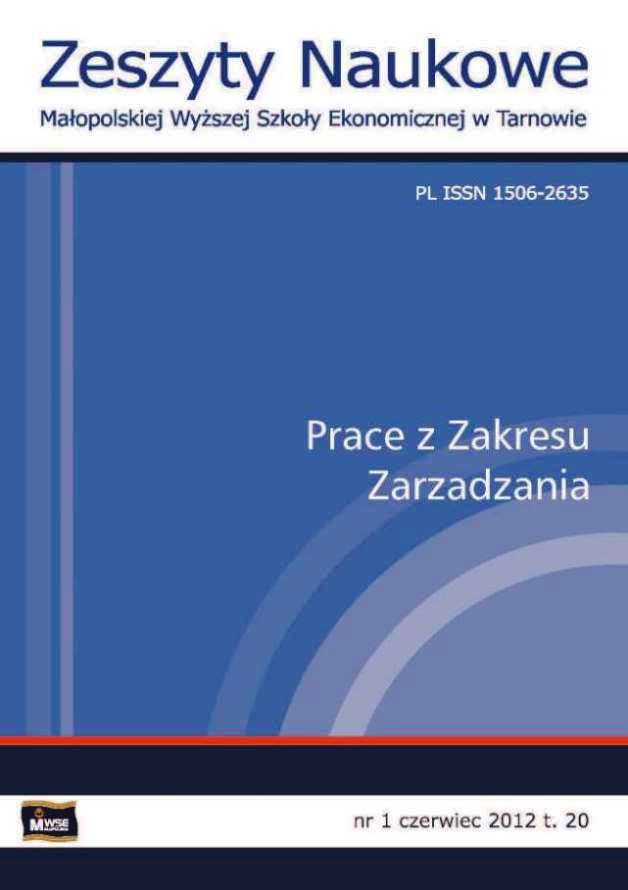Abstract
The author discusses basic ideas related to tourist motivation and the theoretical aspect of travel motivation factors. They are presented from a new perspective, in a three-part structure. As part of the concept, three groups of factors have been distinguished: 1) motivators, which, if present, evoke willingness or inclination to initiate a tourist activity; 2) hygiene factors—if absent, they evoke reluctance to travel; 3) de-motivators—if present, they cause negative attitude towards tourist activity. Areas of their impact on touristic value of a destination (place visited by tourists) are totally different, although they occur simultaneously in a given tourist region (destination). That is why this concept serves as a methodological directive, which suggests that the scope of the study should be expanded to include de-motivating factors related to the investigated phenomenon.
References
Armstrong M., Zarządzanie zasobami ludzkimi, Wyd. Profesjonalnej Szkoły Biznesu, Kraków 2006. ISBN 83-85441-15-8.
View in Google Scholar
Crompton J.L., Why People Go on Pleasure Vacation, „Annals of Tourism Research” 1979, no. 6(4).
View in Google Scholar
Dann G.M.S., Anomie, Ego-enhancement and Tourism, „Annals of Tourism Research” 1977, no. 4, s. 184-194.
View in Google Scholar
Gange M., Deci E.L., Self-determination Theoryand Work Motivation, „Journal of Organizational Behavior” 2005, no. 26, s. 331-362.
View in Google Scholar
Gaworecki W., Turystyka, PWE, Warszawa 2000. ISBN 83-208-1281-X.
View in Google Scholar
Hellwig Z., Zastosowanie metody taksonomicznej do typologicznego podziału krajów ze względu na poziom ich rozwoju oraz zasoby i strukturę wykwalifikowanych kadr, „Przegląd Statystyczny” 1968, nr 4.
View in Google Scholar
Hudson S., Tourism and Hospitality Marketing: A Global Perspective, Sage, London (etc.) 2008. ISBN 978-1-4129-4687-2.
View in Google Scholar
Iwasiewicz A., Metody statystyczne w zarządzaniu jakością [online, dostęp 5.06.2012], StatSoft Polska, 2000. Dostępny w Internecie: http://www.statsoft.pl/czytelnia/jakosc/jametstatystyczne2.pdf.
View in Google Scholar
Kocowski T, Potrzeby człowieka: koncepcja systemowa, Zakład Narodowy im. Ossolińskich, Wrocław 1982. ISBN 83-04-00968-4.
View in Google Scholar
Krippendorf J., The Holiday Makers, Heinemann, London 1987. ISBN 043491083X.
View in Google Scholar
Łukaszewski W., Motywacja w najważniejszych systemach teoretycznych. W: W. Strelau (red.), Psychologia: podręcznik akademicki, t. 2, Psychologia ogólna, GWP, Gdańsk 2000. ISBN 83-87957-05-4.
View in Google Scholar
McIntosh R.W., Goeldner Ch.R., Tourism: Principles, Practices, Philosophy, John Wiley & Sons, New York 1986.
View in Google Scholar
Meger Z., Motywacja w nauczaniu zdalnym, „E-mentor” 2008, nr 4(26).
View in Google Scholar
Middleton V.T.C., Marketing w turystyce, Polska Agencja Promocji Turystyki, Warszawa 1996. ISBN 83-86800-25-9.
View in Google Scholar
Nawrot Ł., Konkurencyjność regionu turystycznego - ujęcie teoretyczne. W: A. Rapacz (red.), Gospodarka turystyczna w regionie: przedsiębiorstwo, samorząd, współpraca, Wyższa Szkoła Zarządzania Gospodarką Regionalną i Turystyką, Jelenia Góra-Kielce 2006. ISBN 83-923997-0-6.
View in Google Scholar
Ostrowski D., Zachowania konsumentów usług turystycznych. W: D. Dudkiewicz (red.), Marketing usług turystycznych, AlmaMer Wyższa Szkoła Ekonomiczna, Warszawa 2007. ISBN 978-83-60197-47-9.
View in Google Scholar
Rheinberg F., Psychologia motywacji, WAM, Kraków 2006. ISBN 83-7318-640-9.
View in Google Scholar
Rudnicki L., Styl życia jako czynnik kształtujący zachowanie konsumenta na rynku turystycznym, „Zeszyty Naukowe Małopolskiej Wyższej Szkoły Ekonomicznej w Tarnowie” 2009, nr 3(14).
View in Google Scholar
Winiarski R., Zdebski J., Psychologia turystyki, Wydawnictwa Akademickie i Profesjonalne, Warszawa 2008. ISBN 978-83-60501-08-5.
View in Google Scholar
Żemła M., Konkurencyjność obszaru recepcji turystycznej - najważniejsze modele i metody badawcze, „Problemy Turystyki” 2006, nr 1-4, s. 25-42.
View in Google Scholar
© Copyright by Małopolska School of Economics in Tarnów. The articles are available under the Creative Commons Attribution NonCommercial-NoDerivatives 4.0 International License


